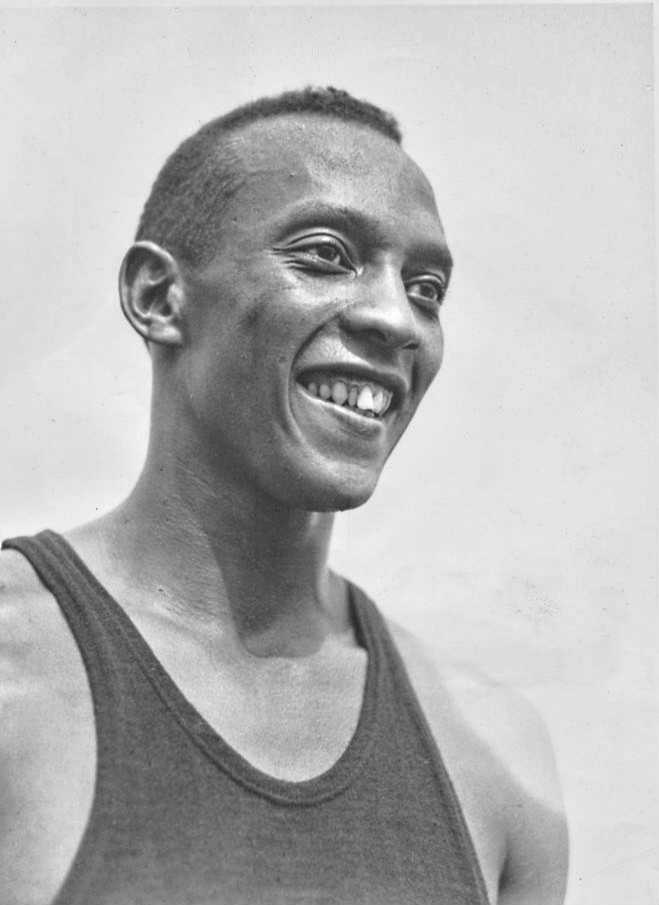Jesse Owens citáty a výroky
Jesse Owens: Citáty anglicky
On the congratulations given by German athlete Lutz Long, a competitor in the long jump, who in some accounts he credited with giving him some friendly advice that helped him to win against him; as quoted in "Owens pierced a myth" by Larry Schwartz http://espn.go.com/sportscentury/features/00016393.html in ESPN SportsCentury (2005)
Kontext: It took a lot of courage for him to befriend me in front of Hitler... You can melt down all the medals and cups I have and they wouldn't be a plating on the 24-karat friendship I felt for Lutz Long at that moment. Hitler must have gone crazy watching us embrace. The sad part of the story is I never saw Long again. He was killed in World War II.
As quoted in "Owens pierced a myth" http://espn.go.com/sportscentury/features/00016393.html (2005), by Larry Schwartz, ESPN SportsCentury
Jesse Owens, Champion Athlete (1990)
As quoted in Blackthink: My Life as Black Man and White Man https://en.wikiquote.org/wiki/Special:BookSources/0688011632 (1970)
1970s
As quoted in People In America : "Jesse Owens" by Barbara Dash http://web.archive.org/web/20071219045105/http://voanews.com/specialenglish/archive/2002-06/a-2002-06-07-2-1.cfm on VOA (7 June 2002)
About Franklin D. Roosevelt, as quoted in Triumph: The Untold Story of Jesse Owens and Hitler's Olympics https://en.wikipedia.org/wiki/Special:BookSources/978-0-618-68822-7 (2007), by Jeremy Schaap, New York: Houghton Mifflin Harcourt, p. 211
1930s
On his wife, Minnie Ruth Solomon
Jesse Owens, Champion Athlete (1990)
Kontext: She was unusual because even though I knew her family was as poor as ours, nothing she said or did seemed touched by that. Or by prejudice. Or by anything the world said or did. It was as if she had something inside her that somehow made all that not count. I fell in love with her some the first time we ever talked, and a little bit more every time after that until I thought I couldn't love her more than I did. And when I felt that way, I asked her to marry me … and she said she would.
Jesse Owens, Champion Athlete (1990)
Kontext: It was bad enough to have toppled from the Olympic heights to make my living competing with animals. But the competition wasn't even fair. No man could beat a race horse, not even for 100 yards. … The secret is, first, get a thoroughbred horse because they are the most nervous animals on earth. Then get the biggest gun you can find and make sure the starter fires that big gun right by the nervous thoroughbred's ear.
“To a sprinter, the hundred-yard dash is over in three seconds, not nine or ten.”
Jesse Owens, Champion Athlete (1990)
Kontext: To a sprinter, the hundred-yard dash is over in three seconds, not nine or ten. The first "second" is when you come out of the blocks. The next is when you look up and take your first few strides to attain gain position. By that time the race is actually about half over. The final "second" — the longest slice of time in the world for an athlete — is that last half of the race, when you really bear down and see what you're made of. It seems to take an eternity, yet is all over before you can think what's happening.
Jesse Owens, Champion Athlete (1990)
“It all goes so fast, and character makes the difference when it's close.”
Jesse Owens, Champion Athlete (1990)
On his final record-breaking leap in the long-jump competition.
Jesse Owens, Champion Athlete (1990)
Interview (1971); also quoted in "Owens pierced a myth" by Larry Schwartz http://espn.go.com/sportscentury/features/00016393.html in ESPN SportsCentury
1970s
“It's like having a pet dog for a long time. You get attached to it, and when it dies you miss it.”
On having his world records beaten
Jesse Owens, Champion Athlete (1990)
Said to Tommie Smith and John Carlos, who had given the black power salute while receiving their Olympic medals
Jesse Owens, Champion Athlete (1990)
Jesse Owens, Champion Athlete (1990)
“I'm old now. It's all right.”
In response to Armin Hary's comment, "You smoke? That's no good. No good!" at the 1960 Olympics in Rome; as quoted in Rome 1960 (2008) by David Maraniss.
1960s
Quoted in "Owens, Back, Gets Hearty Reception" by Louis Effrat, The New York Times, 25 August 1936, p.25 http://query.nytimes.com/mem/archive/pdf?res=940CEFDC1E30E13BBC4D51DFBE66838D629EDE.
1930s
Reported response to learning that his last remaining world record had been broken (31 December 1960); as quoted in Simpson’s Contemporary Quotations (1988) compiled by James B. Simpson
1960s
